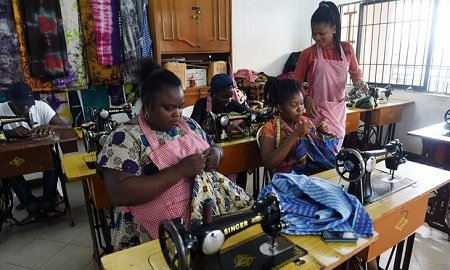Dear Beamers,
Greetings! Apprenticeships in Nigeria have served as a foundational element of skill development for generations, facilitating the transfer of invaluable expertise from seasoned practitioners to their apprentices. This process not only reveals hidden talents but also significantly influences the trajectories of individuals from modest backgrounds towards promising futures. These alternative training programs have been crucial in closing the gap between educational attainment and employment opportunities. In this context, this week’s newsletter is dedicated to exploring the nuanced aspects of apprenticeship training in Nigeria.
Apprenticeship is a distinct approach to learning that occurs outside the conventional classroom environment. This method involves an apprentice working intimately with an experienced craftsman or artisan to gain practical knowledge and hands-on experience.
In Nigeria, apprenticeships tend to be flexible and adaptable, often lacking structured programs. The duration of these apprenticeships can vary, depending on the complexity of the craft, and may last anywhere from several months to multiple years. A key characteristic of apprenticeships is their focus on experiential learning. Apprentices are deeply engaged in real-world situations where they observe, practice, and hone their skills under the tutelage of seasoned professionals, known as master craftsmen. This practical approach facilitates the development of technical skills, critical thinking, and problem-solving abilities.
Apprenticeships encompass a diverse array of trades and crafts, including tailoring, tiling, shoemaking, plumbing, carpentry, and blacksmithing. These training opportunities equip aspiring individuals with essential skills that can foster sustainable livelihoods or inspire entrepreneurial ventures. Participants in apprenticeships typically develop into proficient craftsmen, who, while they may lack formal theoretical knowledge, possess the necessary practical expertise.
In our nation, apprenticeship has evolved as an extension of cultural traditions, zealously maintained to preserve the heritage of individual lineages. Apprentices across various regions of Nigeria have unique experiences to share, which are influenced by their specific environments and the cultural backgrounds of their respective craft masters.
A noteworthy system of apprenticeship is the Igbo model, known as “mu ahia” (learning a trade) or “Imu oru” (learning a craft or vocation), which has developed since the era of the slave trade. The Nwaobi/Igba-boi Apprenticeship System involves a master (“Oga”) and an apprentice (“Nwaboyi”) entering into an agreement for a period typically ranging from four to seven years, during which the apprentice is committed to serving and learning from the master. At the conclusion of his term of service, the apprentice is typically empowered to establish his own vocation or trade as a journeyman. The entrepreneurial and vocational apprenticeship system of the Igbo significantly contributes to the Nigerian economy by cultivating leaders in various fields of human endeavor.

The Igbo apprenticeship system presents a localized approach that effectively fosters robust business development amidst challenging conditions. It also takes into account the socio-economic circumstances of the Igbo people and, potentially, the nation at large if properly leveraged. The Igbo apprenticeship model provides trade students with access to mentors who offer guidance on practical matters. Such mentorship can cover critical aspects including negotiation techniques, pricing strategies, and customer relationship management.
“The Igbo Apprenticeship system has helped more people become financially independent than many business schools around the world. Its main goal is to boost entrepreneurship and economic growth among the Igbo people, while also helping to train more workers and make it easier to get business financing. One great thing about the Igbo apprenticeship system is that it teaches students through real-life experiences. Apprentices learn how to understand local business opportunities, manage market changes, and find high-quality products directly from their day-to-day work in the field.” Says Madueke Ikenna
Despite its old tradition, apprenticeship continues to encounter challenges today, including low wages for apprentices and a lack of adequate regulation within the system. Nonetheless, both governmental bodies and non-profit organizations are actively working to mitigate these issues by striving to implement a more structured framework that ensures equitable treatment for all parties involved. Additionally, access to quality training facilities and resources is still limited in some regions. Yet, it remains evident that apprenticeships play a crucial role in cultivating a skilled labor force that is vital for economic development in Nigeria.
Oyedeji Anu, an apprentice in fashion design, acknowledges that the apprenticeship system is not without its difficulties and challenges. In her words:
“Apprentices face many challenges, like inconsistent training because there’s no set curriculum or oversight, which means the quality of training can vary a lot. Often, apprentices are paid very little and might even experience physical abuse or exploitation, as they depend entirely on gaining skills without proper compensation or protection. And, because there’s no formal recognition or certification for their training, it’s hard for apprentices to prove their skills when looking for jobs, limiting their career opportunities. These problems make apprenticeship programs less credible and effective.”
In earlier times, apprenticeship was a fundamental component of the traditional education system in many Nigerian communities. Young boys would leave their homes to reside with skilled artisans for a set period. Throughout this duration, they would support their masters in various tasks, while progressively acquiring practical skills and techniques. Masters, through a range of tasks from simple to complex, would impart their knowledge and expertise to the young individuals who were eager to learn.
Today, with the widespread adoption of formal education, some perceive apprenticeships as less desirable or as a last resort influenced by factors such as high unemployment rates and limited access to formal educational opportunities. Many parents prefer to enroll their children in supplementary lessons to reinforce classroom teachings rather than encourage them to learn a trade and explore their latent talents. Despite these negative perceptions, apprenticeships have not been eradicated from Nigerian society. In fact, these programs continue to flourish alongside academic studies, serving as a viable means of skill acquisition and job creation.
Several challenges confront professionals who have gained expertise through apprenticeships. Craftsmen who have developed their careers via this route often find themselves undervalued by certain employers across various industries. These employers tend to prefer graduates who may have less practical experience over craftsmen lacking formal education.

Bisi Ayoola contends that it is essential to acknowledge the significant contribution of apprenticeships to workforce development in Nigeria. She states,
“Craftsmen associations in every field should work to formalize their training programs by setting standards, creating mentorship systems, and linking them with existing educational structures. Craftsmen should be given opportunities to demonstrate their problem-solving skills, regardless of their formal education level. Doing this will not only empower individuals with practical skills but also boost economic growth in communities across the country.”
It is important to prioritize the safety of apprentices in the workplace, particularly given the increasing incidents of intellectual abuse and attacks in society. A learning environment that is conducive and free from exploitation and abuse is essential for fostering growth. Without such conditions, young individuals may not be able to fully realize their potential to become skilled professionals in their respective fields.
Masters should provide their apprentices with legal and financial protections to shield them from negative experiences commonly encountered in the apprenticeship system. This includes safeguarding apprentices from non-payment and physical harm by their mentors, while also addressing concerns about the potential theft or mishandling of property by untrustworthy apprentices.
Upon completion of their training and graduation from our curriculum, apprentices should receive the promised startup capital. This empowerment enables them to confidently embark on their professional journeys and perpetuate the cycle of development.
The future of apprenticeships in Nigeria appears promising if proactive measures are implemented by stakeholders at all levels to endorse this mode of training. With concerted efforts and dedication, this traditional practice can be modernized to equip Nigerian youth for substantive employment and foster the nation’s economic development.
Securing respected qualifications that carry significant weight is essential for apprentices as they navigate their career paths. The approach emphasizes affording apprentices an equivalent recognition as university graduates with their degree qualifications. By ensuring that apprentices obtain credentials that are widely respected and valued within the industry, they are poised to compete on equal footing in the job market. This focus on the importance of apprenticeship qualifications underscores the skills and knowledge acquired through practical experience and bolsters the credibility and professionalism of apprenticeship programs.
As Nigeria focuses on future development, it is essential to effectively utilize apprenticeships as a mechanism for youth empowerment and economic growth. By implementing quality training programs that align with market demands and fostering collaboration among industry stakeholders, Nigeria can tap into significant potential for job creation across diverse sectors.
Oni Justin, a caterer and baker, views apprenticeships as a valuable solution to the challenges of youth unemployment. He states,
“As the country faces high unemployment rates, apprenticeships stand out as a practical solution for many young people looking for skills and job opportunities. Apprenticeships are available in a wide range of industries, giving individuals the freedom to pick a path that matches their interests and career ambitions.”
In industries like hairdressing, makeover services, shoemaking, tailoring, and automobile repair, apprenticeships are highly valued by individuals seeking to gain practical skills. These training programs typically occur in small workshops or businesses where experienced artisans provide hands-on instruction to apprentices.
Toheeb Tajudeen recommends that young individuals choose apprenticeships as a path to empowerment. According to him,
“If you’re thinking about becoming an apprentice in Nigeria, here are some practical steps to get started: First, explore different trades to find what really interests you. Then, connect with experienced artisans or local trade associations. When you find potential mentors or training centers, reach out to them directly. Introduce yourself and let them know why you’re interested in learning under their guidance. Show your enthusiasm and commitment right from the start. Remember, there’s nothing wrong with learning a trade, even if you don’t turn it into a full-time career. The skills you gain can help you solve problems for yourself, your family, or even your community.”

The annual influx of young individuals into the apprenticeship workforce provides a practical means to bridge the gap between theoretical knowledge and practical experience. By learning on the job under the mentorship of seasoned professionals, apprentices gain valuable skills that enhance their employability in today’s competitive job market.
Young individuals have the potential to enhance the perception and reception of underappreciated professions among the general public. In today’s digital age, young apprentices can utilize social media platforms to market their services and broaden their customer reach. Online platforms can facilitate connections between aspiring apprentices and skilled mentors, overcoming geographical and socioeconomic barriers. This integration of traditional craftsmanship with modern technologies opens up new avenues for growth and entrepreneurship.
Beyond providing individuals with pertinent skills for employment opportunities, apprenticeships also hold the potential to promote entrepreneurship. Apprentices who absorb trade secrets and business practices from their mentors often find inspiration to launch their own ventures or pursue self-employment in their chosen fields. Those who acquire valuable skills during their training are well-positioned to establish their own businesses or become freelancers. This not only creates self-employment but also stimulates the economy by generating additional jobs through subcontracting and partnerships.
As Nigeria works to diversify its economy, there is an increasing demand for skilled labor in sectors such as agriculture, renewable energy, information technology, and manufacturing. The current shortage of skilled workers in Nigeria presents a significant obstacle to achieving inclusive and sustainable growth. This challenge can be addressed by implementing apprenticeship systems across various sectors. Rooted in Nigerian traditions, this system has long been a vital pathway for skill development and economic empowerment across generations.
Apprenticeships offer a versatile training method that can readily adjust to evolving industry requirements. The future of informal apprenticeships in Nigeria presents significant opportunities for both individuals seeking skills and for the broader economic space. By taking advantage of its rich reservoir of talent, Nigeria can drive sustainable development across various sectors.




